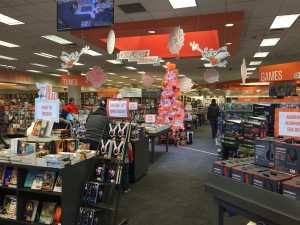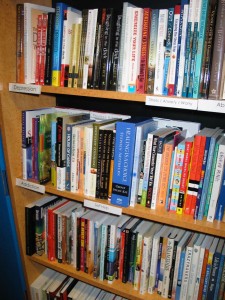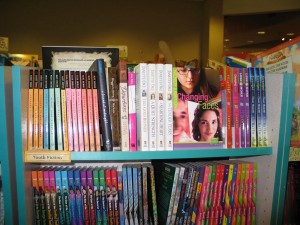Blogger: Wendy Lawton
Anyone out there feeling like a book marketing guru? We often hear from writers that knowing the potential competition for their books is the hardest thing about doing a proposal. But reading the market is an important part of writing books that will sell. Here’s why:
- You need to know where your proposed book will sit on the shelf in a store so that you can fill a need, plug a hole or offer a different voice than everyone else out there.

- You need to know who else is writing similar novels. For novelists you need to be able to supply readers with comparables. “If you like the books of Jane Doe, you’ll probably like mine.” (And don’t worry that someone else has written something similar. Think of your own reading patterns. When you finish a great medieval historical you don’t want to leave that world. You look around for another great medieval, right?)
- You need to know who else has recently addressed your nonfiction subject and how they approached it. If Max Lucado just wrote on your subject, you might want to wait awhile before proposing this book. Remember, when someone walks in the bookstore and asks for a book on XYZ, the frontliner is going to immediately think of the A-list book on that subject.
- Or you need to know if there’s been a recent glut of books on this subject. Publishers will hold off if the category is full.
So. . . agreed, right? Reading the market is essential for authors. But how does one do it? Let me offer a few suggestions:
 Read shelves. Spend time in the stores. Pay attention to which books are cover out. How many copies does the store have? All of these tell a tale and help you read the market.
Read shelves. Spend time in the stores. Pay attention to which books are cover out. How many copies does the store have? All of these tell a tale and help you read the market.
Talk to librarians. Nobody knows books like librarians. Granted, they may not be as current as the market is, but they know what’s out there and they know which books get checked out most.
Talk to Bookstore frontliners. Frontliners are the salespeople who work in the bookstores. They are the ones who direct readers to books. Find out what they know.
Study Goodreads and other online reading apps. There’s much information on the market tucked into these online communities.
Read magazines like Romantic Times. These periodicals are not trade magazines. They go to readers. The reviewers are avid readers.
Spend time on Amazon, Christian Books. These recent resources are pure gold for writers. Not only can they help you in reading the market and knowing what’s out there but they can help you with the “readers who purchased this, have also purchased. . .” comparisons.
Collect anecdotal evidence. This is the fun way. Always ask “Read any good books lately?” “How did you hear about it?” “Where do you buy your books?” Everyone you meet is a potential resource and everyone loves to talk about what they are reading.
Identify typical readers and separate them from professional readers. This is essential. When we hang with other professionals– publishers, editors, writers– we are not talking to run-of-the-mill readers. We need to always keep that in mind.
That’s just the tip of the iceberg. How to you keep on eye on your unique market? Do you panic if a similar book comes out when you are midway through yours? Let’s talk.


Hi Wendy,
Funny you should mention the word panic. A friend mentioned to me another author had written a book with a hero like mine. They had the same background and career goals. I panicked, and I read the other book and discovered she was correct, but the heroines, theme, and story were completely different. So I’m continuing to edit my story.
Thanks for sharing. I thought I was studying the market, but you gave us great ideas to get a better understanding.
Jackie, concerning similarities in protagonists, it might be helpful to think of Tolstoy’s comment about happy families being alike, but unhappy families being unhappy each in their own way, as something of an analogue.
* Since salvation is centered in Christ, there will be similarities in outlook and worldview among Christians of the same age and experience…and since career goals are driven by these, similarities will crop up there, too.
* That may be why we, as the products of a fallen world, tend to remember villains more readily, because they can be more fatally unique…I mean, when you think of Star Wars, who comes to mind first, Luke Skywalker or Darth Vader?
* Actually, I think of Chewbacca first…
Great thoughts, Andrew. And I’m soooo not surprised Chewbacca is the first to come to mind for you. 😉
When my son (now 40+ years old) was in middle school, he and a friend wrote a comic book series starring Luke Warmwater. Alas, the comic book wasn’t a best-seller.
I remember in my early writing days feeling the same panic. Truth is you could give twenty novelists the same setting and plot and the books would be wildly different.
I think it’s more of an issue with nonfiction than fiction.
When I took my first writing class after college (2001) it focused on children and teens. I looked at the different age categories and liked the look of writing for teens. So I started ordering popular YA from our library for research. I discovered that YA is a fabulous genre, something that I love to read. If you want something serious, YA addresses it all, but tends to move at a nice zippy pace with humor and drama abounding. If you want something fun, well YA is super fun with werewolves and dirigibles and girl spies and boy geniuses. I write romance now and dabble in middle grade (guess what I read to my kids every night and have discovered is fun fun fun!) but I still read YA, just for fun, because they are seriously the best books in the world. I find books by word of mouth, usually from teachers, Moms, or people who write YA too. I also have been following some YA agents since they first started out and I know the ones whose taste matches my own. I’ll go and look at an agency website, even though I know they don’t rep Christian fiction, just to find my next read. Reading in my genre is a delight. I love it!
I agree with you. Some of the best books I’ve ever read have been middle grade and YA.
I read half a dozen Middle Grade or YA novels every week. I review a few of them, but if Amazon ever starts accepting reviews only for books bought from them I’d be in big trouble. Thank God for public libraries!
Great suggestions for market-reading, Wendy. I’m sure this list will go up in print on many refrigerators and bulletin boards. Me…I’ll have it tattooed on my arm.
* I don’t really worry about trends, though. I’ve learned that people who like what I write come and return for voice and worldview, not for intricate plotting.
* There is only one real reason a person picks up a book, anyway…and that is to answer the following questions –
“Who am I?..where am I going?..is there Hope?”
Yes. Is there hope? That is key to my reading.
Thanks for sharing your ideas, Wendy. You’ve given me another plate of food for thought.
*I do keep an eye on the YA shelves in both the Christian and secular market. It’s amazing the number of books with a similar paranormal theme. Is the vampire, good angel vs bad angel thing ever going to wane? Obviously writers and publishers alike are not panicking about an overdone topic.
*Anyhoo, my neighbor is a voracious reader with a personal goal of 200 books this year. I might pick her brain as another avenue of research.
That’s about how many books I read, but picking my brain might not be a help. Barb says it’s like a shelf with canned food. Put something new on the front, something else falls off the back.
I wish I had the reading time of your neighbor. 200 books! She’s an interesting resource.
You should talk to my older sister. She works one full-time job and a couple of days at the public library. My sister told me that last year she read 500 books! She reads so fast. I don’t even try to keep up. Last year I read or listened to 124 new/new-to-me books, 19 novellas, and 15 re-reads.
“You don’t want to leave that world” … that is a comforting reminder. It’s okay. But yes, being a new writer to fiction, if I heard of another book with my same unique angle, I would be heartbroken probably … afraid someone with more experience would do a better job. But you always give hope … thank you for that. I’ve been out of town all week, and I’ve sure missed the interaction here … I’m so hooked on the friendships here.
Shelli, say WHAT???? You’d be worried that someone with more experience could do better than you?
* Henry Ford said that History Is Bunk, and ABS says that Experience Is Bunk.
* Dear Shelli…you are our 800 Pound Gorilla of clarity and faith. The honesty and purity of your love for Christ shines through every word you write.
* Let the other guy worry, because Jesus’ very own King Kong has arrived, and…quake in your Birkenstocks, Other Guy…she’s from TEXAS.
* And she can write like nobody’s business.
You guys are awesome! I’m in a car on a Florida interstate right now! ! Ready to get back to Texas! ! We parked in the King Kong section at Universal Studios, Andrew! ! You got me tickled.
Ditto on Andrew’s comment. I couldn’t have said it better.
I am reminded of some very wise words I read years ago and wish I could remember the source. As Christians, we know how vital it is to be humble. Pride is one of the greatest sins, and it makes us vulnerable to a host of others. We all remember the Pharisee and the tax collector praying in the temple.
True humility isn’t convincing ourselves that we’re not anyone special so we can’t expect to do something extraordinary. It’s recognizing how well we actually can do something and never forgetting it’s only God’s gifts that allow us to excel. We don’t make ourselves brilliant or talented, but we should always use what God made us to do the very best we can. Great gifts produce great results.
Remember Jesus’s parable of the talents. God himself selects the number of talents and expects us to work to maximize the yield. I want to be a 10-talent person who uses what God gave me to the very best of my ability to serve the highest goal He puts before me. I’ll never reach the mountaintop if I keep telling myself I can only climb a hill. I want to push toward the highest goal so I’ll someday hear the words, “Well done, good and faithful servant.”
I suspect you’re one of those 10-talent women, Shelli, and I expect great things of you. I think God does, too.
I can’t wait to meet you in person, Carol!!
And Shelli, it’s not only “more experience” that makes a great book it’s the heart of the writer.
Wendy … thank you.
Is it better to do this kind of research AFTER a manuscript is completed and being polished, during, or after?
Uh…that was two “afters.” Sorry. One of those should read “BEFORE.”
Personally, I didn’t mind the extra ‘after’. The Afters is one of my favourite Christian bands.
Hannah, I’m not sure. You definitely want to know the market you are aiming for but you don’t want to merely “write to the market.” I’d say do market research continuously so you have a good handle on it and then be more specific as you craft your proposal.
Thank you, Wendy, for these great suggestions. You’ve reminded me to keep my eye on a book review blog and Facebook I follow. They are run by someone who loves cozy mysteries, and she gives and accepts recommendations. I’ve found out about some sweet books.
The readers following this blog share what they like about various series. I highly recommend authors read book review blogs and observe what excites readers in their genre. It’s better than chocolate.
Blessings ~ Wendy Mac
Yes. Review blogs are an excellent resource.
Wendy, when I read your opening question, my first though was, “Oh, goodness NO!” But, I can see the necessity of being able to become much more knowledgeable about books than I am.
*I so appreciate all the resources you offer to help me with this.
*To keep an eye on my unique market, I’ve checked Amazon and what books are recommended. That is a great resource. I also talk with friends who are avid readers to see what they’re reading and why they love it. I think book reviewing blogs can also be helpful, especially if the posts are written by readers.
*I have worried about books written by selling authors that are similar to mine in theme or characters. As I prepared my proposal for my current book, I found others had written about similar characters. The great thing is, each writer creates a unique story based on his/her life experiences and passions. This has given me some comfort and some confidence as a writer.
*So, would it be terrible to ask some of those questions you shared on our Facebook pages to see what people say about what they’re reading, where they got their book and how they heard about it?
I think that would be a great idea, Jeanne. It might even be fun to use something like Survey Monkey to set up a survey and collect data, and later report your findings. You could cite that data in your proposal.
Oh, I like that idea, Wendy. Thanks for that. 🙂
The semi-engineer in me always wants concrete suggestions on how to approach a problem, and the blog today provides a great set. The comment about typical versus professional readers is thought-provoking. The more I learn about the writing craft, the more I analyze everything I read for the technical quality of the writing. Now I see flaws and weaknesses that didn’t used to bother me. That sucks some of the fun out of reading. It’s like being the structural engineer who looks at the bridge and questions its load bearing ability rather than the photographer who thinks rusty old bridges are pretty.
Actually, I AM a structural (bridge) engineer, and I don’t look at bridges for anything but their aesthetic value, unless I’m called to do an analysis.
* Same thing with writing. I don’t look at craft, in no small part because ‘craft’ is (beyond a certain baseline) simply fashion.
* The books that are being published today typically jump into some kind of conflict in the first few paragraphs, don’t use adverbs, favour ‘strong’ language…and while following this paradigm is undoubtedly the best path to sales in a society coarsened by text messaging and given a kind of lobotomized ADHD by visual media…to say that it’s ‘better’ writing than that which was produced in the past is simply wrong.
* We haven’t evolved, in a literary sense. We’ve changed to meet expectations. That’s all.
* When I read, once a book is ‘readable’ – it holds my attention – I don’t worry about anything else except that which the author is trying to say.
And not reading for craft may be…and probably is…my fatal deficiency as a writer.
Right on.
In reference to your craft=fashion comment, that is.
I agree with you totally about the beauty of the older style of writing. I wrote that way myself until I got my first contest feedback. I’ve retrained because I’m keeping my eyes on the prize. We plan to use the money I make from selling books to support overseas missions. Never get to market and make money = never help build that orphanage in Africa.
Carol, that makes sense, and it’s the right decision.
* Different for me. I’ve lost the meaning – I no longer believe that I’ll ever ‘get there’ with a writing career. Wrong message, wrong voice, not enough time and energy, whatever. So I write that which I write, and if anyone wants to read it, fine.
You’re already there, Andrew. You know from feedback that Pure in Heart has already changed things for people. You can’t get more “there” than that.
Oh, I so agree. I long for a slower, thought-out, first person viewpoint, writing style. So many authors today seem to ride on emotion without much depth. There’s a lot of action, and romance, but not much to make one think and savor. There are some books in women’s fiction that lean more toward this, but they are usually centered around a particular topic and I often leave the book very depressed. These are Christian books not mainstream. Have any of you ever read Florence Barclay’s novels? She was an English novelist with books set in the early 1900’s. I always come away from her books with a spiritual lesson, loving romance and marriage more, and savoring the beautiful language and writing style.
Oh, so true, Carol. I love that analogy! I love old bridges … there is one near me, and I’m always saying I need to take a picture of it. I just never have my camera with me when I pass it.
I know I have a winner, Carol, when I’m reading a manuscript and I forget to look for the technique because I’ve been sucked into the story and the characters.
That’s saying a lot given the nature of what you do for a living!
I appreciate this post. It’s a “save for later.” Thanks.
On a personal level but one that flows into my writing, As some of you know, I write spiritual material, however I find myself reading predominately outside of my protestant roots. I am a contemplative Christian, the books I find that address the way God is growing me are not usually of the protestant flavor. Well, it’s a bit of a challenge. To read with loving connection to the author’s take on spiritual life, I must go to those who have found the sweetness of intimate fellowship with Christ, life-changing in substance, rich in depth of spiritual experience. The tone of the person’s writing immediately tells me if they have found God in a very real sense and dynamic. Contemplation of God and His spiritual truth defines my writings. It’s interesting how this one area has defined my writings. So I gravitate to monastic writings, and find my home with concepts the monastics provide even though I’m an evangelical in theological interpretation. It’s sort of strange. It’s a cross over, and has been meaningful. I have to align my writings in the context of meditative prose. It’s been good for me to branch out beyond what is comfortable.
I’m glad you wrote about this today. I especially liked the point you made about how it’s okay if you are writing a book similar to something already out. When I finish reading a book that I love, the next thing I do is search for a sequel. If there isn’t one, I search for something similar because I want to continue the experience I had fallen in love with.
I think it’s also important to be aware of current titles. Consider the confusion today between “The Girl on a Train” by Paula Hawkins and “Girl on a Train” by A.J. Wains. And by the way, this librarian is aware of the current market. With a tight budget, I study reviews to ensure I’m buying the best books available for my library. 🙂
Those two confuse me too. And when I read Wendy ‘s suggestion to check with my favorite librarian, I thought of you!
I’m so glad you thought of me. 🙂
FANTASTIC list Wendy. My favorite question to ask myself when setting up my market research “Are You Sure?”
Do readers and purchasers of my type of book SHOP in bookstores?
AM I SURE?
Does my book measure up to my competition?
AM I SURE?
Do the retailers I am hoping will shelve my books CARRY books like mine?
AM I SURE?
Do books like mine sell?
AM I SURE?
It is so easy to believe everything I think that I forget to make sure of my beliefs. I echo your ideas. Get out of your writing chair and get into the stores, libraries and into the conversations with booksellers, typical readers and librarians. be SURE.
Thank you, Wendy. And yes, that sudden flash of internal “freaking out” happened to me last year. Upon sharing a few details from the chapter I had been working on at the time, a friend responded with, “Hey, that sounds a lot like …” Terrible feeling. But after a couple days of sulking, along with bouts of reinvigorated brainstorming and prayer, I decided to have faith in what I had believed would make my work stand out from the beginning and kept writing. It paid off.
Believing in oneself is always the way to go!